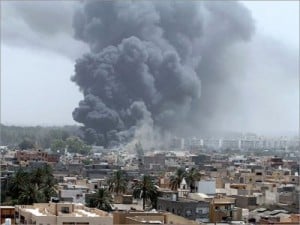NATO War Crimes: Depleted Uranium Found in Libya by Scientists

War crimes and crimes against humanity have been and continue to be committed in the Libyan Arab Jamahiriya by NATO. Amongst these crimes, the Atlantic Alliance has been using depleted uranium against Libya, specifically civilians and civilian infrastructure.
Bombed sites in Libya have been visited by professional scientists working in the Surveying and Collecting Specimens and Laboratory Measuring Group. The scientists and trained experts have conducted field surveys looking for radioactive isotopes (radioisotopes) at bombed sites. The samples from these sites were then scientifically analyzed at the laboratories of the Nuclear Energy Institution of the Libyan Arab Jamahiriya.
Analysis in Libya through inductively coupled plasma has shown that several sites contain even higher than expected doses of uranium. Holes caused by NATO missiles also have high radioactive measurements, as do the fragments of NATO ordinance. Sites analyzed by the teams of scientists include Bab Al-Azizia and Souk Al-Ahad.
The teams of scientists have found it hard to conduct their important work during the NATO bombings. They have put their health in jeopardy and their lives at risk. Moreover, many of these sites have been bombed numerous times and again on different days. This adds an extra dimension of danger to the teams.
The U.S. and NATO are using “dirty bombs” in Libya. These are the countries that claim that Iran and Syria are attempting to make nuclear weapons. So far, however, it is these very same countries that are using weapons of mass destruction (WMD) and use nuclear technology in an irresponsible and criminal manner. An international war crimes tribunal is in order. The Obama Administration, Nicolas Sarkozy, David Cameron, and NATO cannot be allowed to stand with impunity.
Examples of bombed civilian structures:
© Mahdi Darius Nazemroaya, CRG and Réseau Voltaire, 2011.
© Mahdi Darius Nazemroaya, CRG and Réseau Voltaire, 2011.
© Mahdi Darius Nazemroaya, CRG and Réseau Voltaire, 2011.
© Mahdi Darius Nazemroaya, CRG and Réseau Voltaire, 2011.
Mahdi Darius Nazemroaya is a Research Associate for the Centre for Research on Globalization (CRG). He is currently in Libya as an international observer and member of an international group of journalists and writers from Europe, North America and the Middle East.

